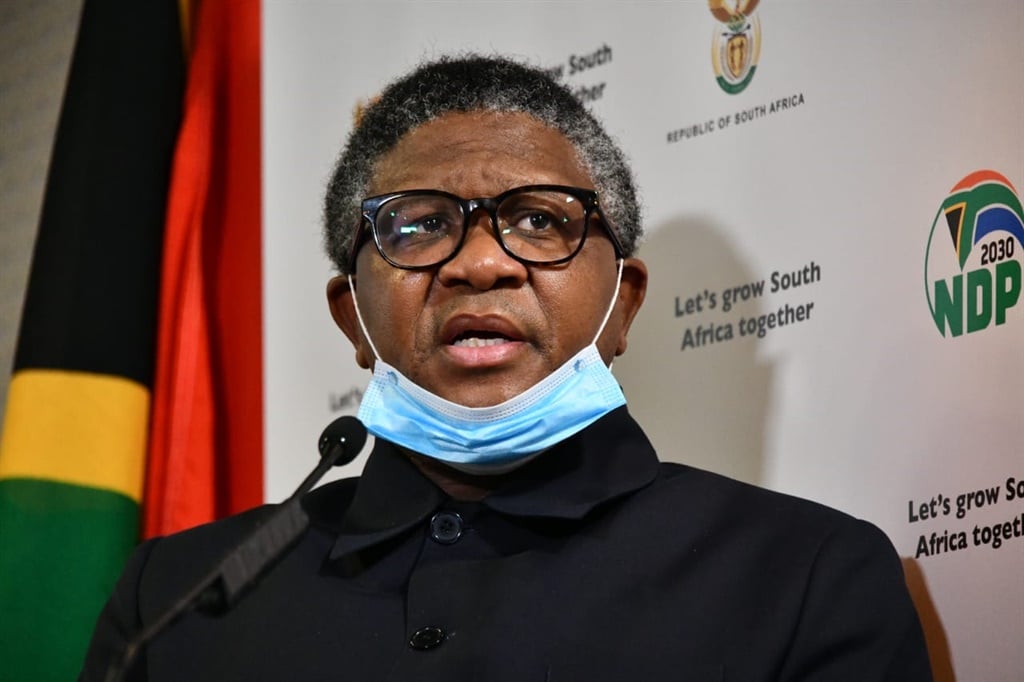


Transport Minister Fikile Mbalula.
- Mbalula urges taxis to keep running, not go to war with government.
- Government has no more money to give – and already scraped the bottom of the barrel, he says.
- EFF agrees with taxi association that R5 000 compensation per taxi is too little – suggests R20 000 each.
“This is not the time for war.”
This was the plea from Transport Minister Fikile Mbalula last night – as he urged taxi associations not to shut down on Monday, as some have threatened.
And he openly admitted the financial support offered the taxi industry was “too little” to compensate for the lockdown.
“It will never cover the loss. The taxi industry suffered hammer-blows,” he agreed.
But government simply did not have more money to give, Mbalula explained.
He described bluntly that demands for more money in government support, were “a pipe dream” – government had no extra funds which it had “stuffed somewhere”.
Instead, the Minister urged taxis to run today – and not to hurt the economy even further.
“Our economy is falling apart,” he warned.
In a prepared speech, Mbalula said: “We have noted with concern the announcement by the Gauteng provincial arm of the South African National Taxi Council (Santaco) of a shutdown on Monday, as a result of their objection to the Taxi Relief Support we announced on Friday.
“This afternoon, we held a special Minmec to deliberate on the Taxi Relief Support and the threat of a shutdown by Santaco in Gauteng. The meeting was attended by the MECs, Executive Mayors of eThekwini and Ekurhuleni, as well as MMCs from Johannesburg, Cape Town, Nelson Mandela Bay and Buffalo City metros.
“We find this action rather unfortunate and counterproductive … A service shutdown will not only negatively affect the working class, but will worsen the devastation of the industry. The taxi industry is in the process of recovery from the combined impact of limited operating hours and reduced loading capacity as a consequence of the Covid-19 pandemic.
“The decision to avail R1.135 billion to the taxi industry as relief support was not an easy one. We literally had to scrape the bottom of the barrel to reach this amount, because we believe the taxi industry is deserving of support as the largest mover of our people.
“We must equally appreciate that government has limited resources, which must equally benefit all other sectors. It is for this reason that none of the relief packages equate to compensation for losses, but rather limited support to cushion the impact of the Covid-19 pandemic. The reality is that there is no more money available beyond what the government has offered,” Mbalula said.
Taking questions at the press event, Mbalula urged taxis to ensure employees get to work, arguing many could face being fired, if they failed to arrive for duty.
These vulnerable workers included “your brother, your sister”.
He urged the taxi industry not to compromise their fragile employment prospects.
“This is not the time for war. Let’s continue to talk. It’s the time to work and build together,” Mbalula urged.
Mbalula said the industry faced far tougher and more serious negotiations with government in future, as the industry formalised.
When these took place, he agreed the parties may reach deadlocks, which could in theory warrant tough action like taxi shut-downs.
But to shut down on the current issue would be “counter-productive”.
Asked about potential violence, Mbalula warned: “The rule of law, and the authority of the state must be exerted.”
Everyone had a right to protest, “but must not infringe on the rights of others who want to get to work, and to operate”.
Gauteng Transport MEC Jacob Mamabolo said he was “deeply worried” about commuters and workers, and hoped law enforcement agencies would ensure there were no “acts of violence” which threatened the safety of commuters or other forms of transport on the road.
He added concern about inter-taxi violence – should some groupings choose to shut down services, and others chose to operate.
But the Economic Freedom Fighters said on Sunday it supported demands for more support for taxis.
“We agree that R5 000 per taxi is not and will never be enough. Each taxi must be given at least R20 000 as a relief fund,” the party said.
The EFF said it believed the taxi industry was “the best mechanism of wealth distribution” as it was “closest to the lowest ranks of our economic system”.
“The money in the hands of taxi drivers will surely be spent on the taxi industry ecosystem, which includes informal traders around taxi ranks. This will benefit millions of families who will have actual buying power, boost demand and lead to more trade in the economy,” the EFF said.
The party further argued that banks should be banned from repossessing taxis, and should instead be given an “interest-free payment holiday” for a full year, to survive from the impact of revenue losses from the lockdown.

